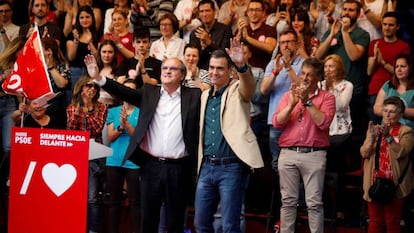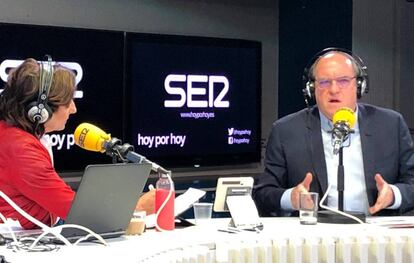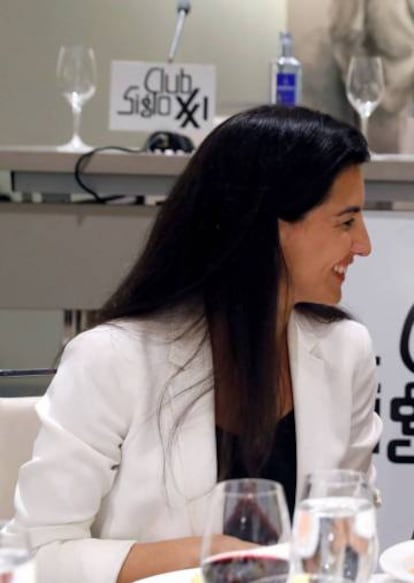Will Sunday’s elections in Spain trigger a new era of coalitions?
Polls suggest the fragmentation seen at the national vote will extend to the local and regional level, giving added clout to small parties such as far-right group Vox

Spain on Friday entered the last day of its campaign race for the municipal, regional and European elections of May 26.
The country is still fresh out of a snap general election that gave the highest number of seats to the Socialist Party (PSOE), but yielded a fragmented Congress with no overall majorities. Political leaders are waiting for the outcome of the Sunday vote to start crafting governing pacts, and polls suggest that a similar fragmentation could emerge at the local and regional levels, forcing parties into coalitions or pledges of case-by-case support.

This could benefit Vox, a new far-right party that has just entered the national lower house of parliament with 24 lawmakers and hopes to make similar gains on Sunday. The ultranationalist group first entered Spain’s democratic institutions in December, when it picked up seats in the Andalusian parliament after the southern region held an early election.
“Vox will no longer support someone who does not sit down to negotiate with us,” warned a party official, alluding to the fact that the group played the role of kingmaker in Andalusia by propping up a center-right government that it was nevertheless not invited to join.
Vox’s support could now prove relevant in the Madrid region, where polls suggest that right-of-center parties could win on Sunday, whereas removing the leftist mayor Manuela Carmena from City Hall will prove harder.

On Friday, acting Prime Minister Pedro Sánchez made a public appearance with the Socialist Party (PSOE) candidates to the regional and local governments, Ángel Gabilondo and Pepu Hernández. Speaking on the Cadena SER radio network, Gabilondo said he does not favor a coalition government, but would rather reach deals with the leftist groups Más Madrid and Podemos.
But just like Sánchez at the national level, the next leader of the Madrid region may not have much of a choice. Isa Serra, the Unidas Podemos candidate, has noted that “the time for absolute majorities has passed. I’m afraid that the parties of the two-party system are going to have to accept that they need to learn to reach agreements.”
The Popular Party (PP), which currently controls the regional government, is nominating Isabel Díaz Ayuso, a journalist by trade who managed the 2015 digital press campaign for Cristina Cifuentes, a former regional premier who was forced to resign over an academic scandal. Díaz Ayuso has made headlines during the campaign race due to controversial statements about traffic jams and unborn children.
Catalonia
In Catalonia, which is only holding municipal and European elections on Sunday, the independence issue has been a factor in the campaign race. In Barcelona, the two main mayoral candidates, the incumbent Ada Colau and Ernest Maragall of the Catalan Republican Party (ERC), held one last debate on the radio station SER Catalunya.

“This is a progressive city. We have fomented feminist policies, and we are the only guarantee of a progressive government,” said Colau, of the leftist group Barcelona en Comú. “The big remaining challenges are the fight against inequality, the right to energy and water, and progress against pollution to make this a better place for everyone.”
But the representative for the separatist ERC – whose leader Oriol Junqueras is currently on trial for rebellion at the Supreme Court – portrayed the municipal ballot as a choice between “Spanish monarchy or a Catalan republic. This is the decision that citizens must make.”
Tu suscripción se está usando en otro dispositivo
¿Quieres añadir otro usuario a tu suscripción?
Si continúas leyendo en este dispositivo, no se podrá leer en el otro.
FlechaTu suscripción se está usando en otro dispositivo y solo puedes acceder a EL PAÍS desde un dispositivo a la vez.
Si quieres compartir tu cuenta, cambia tu suscripción a la modalidad Premium, así podrás añadir otro usuario. Cada uno accederá con su propia cuenta de email, lo que os permitirá personalizar vuestra experiencia en EL PAÍS.
¿Tienes una suscripción de empresa? Accede aquí para contratar más cuentas.
En el caso de no saber quién está usando tu cuenta, te recomendamos cambiar tu contraseña aquí.
Si decides continuar compartiendo tu cuenta, este mensaje se mostrará en tu dispositivo y en el de la otra persona que está usando tu cuenta de forma indefinida, afectando a tu experiencia de lectura. Puedes consultar aquí los términos y condiciones de la suscripción digital.








































